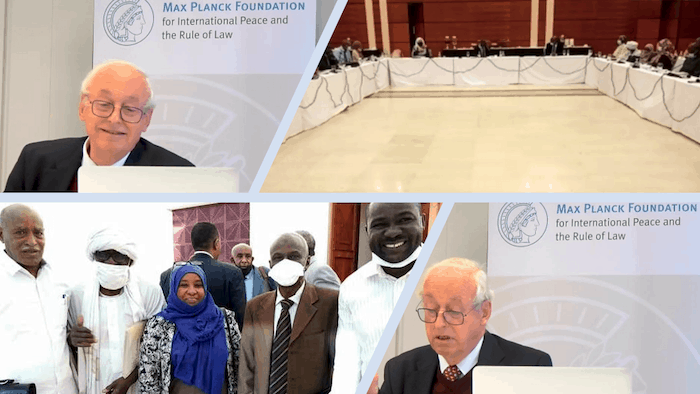Second online workshop on options for a future Permanent Sudanese Constitution
In continuation of its previous endeavours supporting the Sudanese Republic on its way towards a new Constitution under the framework of the project Support to the Constitutional Reform Process in Sudan funded by the German Federal Foreign Office, the Max Planck Foundation implemented its second online workshop.
From 5 to 9 December 2020, the Foundation convened an inclusive group of Sudanese stakeholders representing the key actors within the constitutional reform in Khartoum, and the head of project and research fellows facilitated the discussions online from Heidelberg, Germany. The workshop was opened by Judge Sawsan Shendi, Supreme Court Judge and Dean of the Sudanese Legal and Judicial Sciences Institute, Dr Tariq Magzoub, Head of the Department of Constitutionalism and Research at the Sudanese Ministry of Justice, in Khartoum and Professor Rüdiger Wolfrum, one of the Foundation’s Managing Directors and Head of Project, in Heidelberg. In addition, Sudanese legal experts and the Foundation’s local consultant in Sudan greatly supported the workshop. In the final session, Dr Bloss from the German Federal Foreign Office in Berlin and Mr Sonntag, the Deputy German Ambassador to Sudan in Khartoum, made the closing address congratulating on the success of the implementation of the various sessions and legal discussions throughout the five-day workshop despite the difficulties of an online implementation and the challenges due to the COVID-19 pandemic.
Throughout the event, the Foundation’s Sudan Team deepened the discussion of options for a future Sudanese Constitution with the participants in Khartoum. Thematically, the workshop this time focused on the economy and economic related matters including land issues, governance and distribution of mineral resources, as well as the central bank, taxation and decentralisation. The discussions were based on a variety of draft constitutional provisions to further engage in public discourse on constitutional matters and prepare for future deliberations on a permanent constitution in the country. Furthermore, the provisions of the recently signed peace agreements and peacebuilding measures were addressed in depth.
In accordance with the Foundation’s guiding principles, the workshop was distinctly aimed at providing a neutral forum for technical discussions on the wide range of representative viewpoints regarding the inclusive constitutional reform process in Sudan. The workshop allocated specific sessions for discussions allowing ample opportunity for participants to share their views.
Despite the digital implementation, the new format allowed participants and experts to actively engage with each other and successfully continue the discussions on constitutional reform. The Foundation envisages the continued online implementation until a time when travel to the country is viable again.

